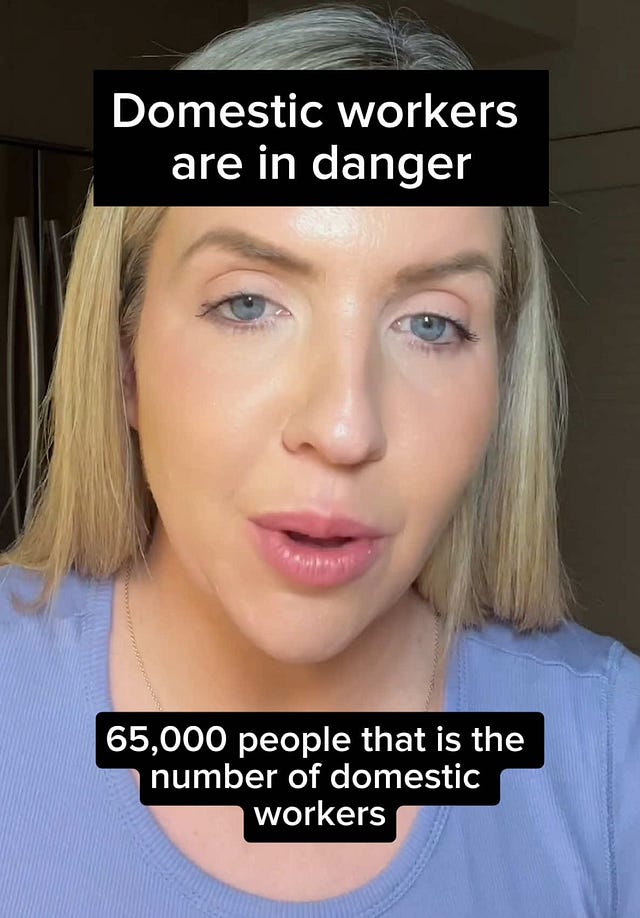California Domestic Workers Just Won Key Wildfire Protections
“I’m pregnant and employers are asking me to clean up ash,” one worker said.

by Nicole Bardasz, More Perfect Union
Amid devastating wildfires, California’s 330,000 domestic workers—including nannies, housecleaners, and home care workers—just won a crucial victory.
These domestic workers are among the only workforce in the state excluded from OSHA standards. But last week, Cal OSHA announced it would expand wildfire cleanup protections to all workers. This change couldn’t come more urgently, as Los Angeles deals with the devastation from the Palisades and Eaton fires.
“I’m pregnant and employers are asking me to clean up ash,” said domestic worker Andrea Lopez. “With this news, I now know that I can demand health and safety protections because it is my right.”
Domestic workers are often tasked with cleaning up the aftermath of wildfires and other disasters. After the 2018 Woolsey Fire, more than 50 workers reported deep-cleaning ash-covered homes in Malibu without masks, gloves, or basic protective gear. One worker interviewed by KALW described being sent to clean a home laden with toxic ash without any prior warning or safety equipment.
“My employers didn’t tell me anything,” she said. “They didn’t give me a breathing mask, they didn’t give me basic gear.” She cleaned the entire house for three days straight, because she was desperate for work.
Cal-OSHA has now clarified that this work, cleaning up ash and wildfire debris, falls outside the traditional duties of domestic workers — and is therefore covered by agency safety standards.
While this is a step in the right direction, cleaning up ash is far from the only danger workers face during wildfires. The office of California Senator María Elena Durazo detailed that domestic workers and day laborers have been asked to stay behind to “fight fires, guard homes or pets, [and] work in smoky conditions.”
During the New Deal era, lawmakers in the Jim Crow South refused to pass legislation that would extend protections to Black workers. As a result, farmworkers and domestic workers were specifically left out of the Fair Labor Standards Act, which established minimum wage and overtime pay, and the National Labor Relations Act, which gave workers the right to organize a union. Domestic workers were also excluded from the Civil Rights Act of 1964, and carved out of the Occupational Health and Safety Act of 1970, which sets workplace safety standards and gives workers the right to report dangerous conditions without fear of retaliation. Those exclusions laid the groundwork for the unequal treatment of domestic workers to this day.
According to a 2020 report by the UCLA Labor Occupational and Safety Health Program, 51 percent of domestic workers in California report facing “pressure from their employers to work in dangerous conditions.” Another study found that during the pandemic, domestic workers were three times more likely to contract COVID-19 than other workers. And Human Rights Watch reports that domestic workers in private homes are among the most exploited and abused workforces.
But in recent years, domestic workers have waged a successful national campaign for labor rights. Twelve states and the District of Columbia have passed a Domestic Workers Bill of Rights, and in California, domestic workers and their allies have scored a number of recent victories despite opposition from Governor Gavin Newsom. Last year, the California legislature voted overwhelmingly to finally include more than 175,000 agency-hired domestic workers under California’s Occupational Health and Safety Act.
For domestic worker advocates, this latest achievement is bittersweet. The legislation won’t go into place until July of this year, leaving workers particularly vulnerable during the ongoing California wildfires. It also leaves out the large portion of domestic workers who are employed directly by households.
The original bill included agency-hired workers as well as any workers facing “high hazard” conditions like tall heights, wildfire or disaster cleanup, or exposure to carcinogens, but was watered down to appease Gavin Newsom, who had vetoed similar legislation in 2023 and 2020.
While Cal-OSHA’s most recent clarification around wildfire cleanup standards helps close some of the gaps, there’s much more to be done to guarantee that all domestic workers are safe in the workplace.
“We won’t stop,” Kimberly Alvarenga, the director of the California Domestic Workers Coalition, said in October when Newsom signed the aforementioned bill. “We will continue to work towards the day that all domestic workers have health & safety protections.”
Meredith Lynch contributed additional research/reporting.


